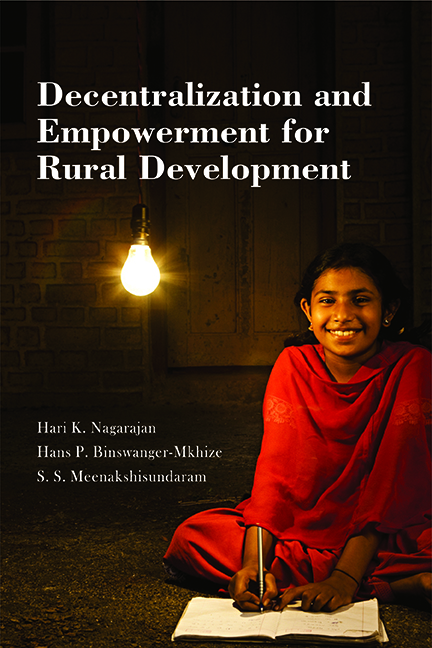Book contents
- Frontmatter
- Contents
- List of Tables and Figures
- Foreword 1
- Foreword 2
- Preface
- 1 Introduction
- 2 Decentralization: Cross-country Experiences
- 3 Thinking about Decentralization in India: 73rd Amendment and Beyond
- 4 Literature
- 5 An Overview of the Data
- 6 Analytical Approaches and Econometric Methods Used
- 7 Can Panchayats Improve the Quality of Services? Some Qualitative Evidence
- 8 Impact of Political Reservations for Women in Panchayats
- 9 Importance of Individual Empowerment of Women
- 10 Governance, Service Provision and Development Outcomes
- 11 The Impact of Fiscal Grants on Tax Efforts of Village Panchayats
- 12 Incidence of Identity-based Voting and Bribes in Panchayats
- 13 Panchayats and Household Vulnerability
- 14 Key Findings, Conclusions and Policy Recommendations
- References
- Index
- About the Authors
10 - Governance, Service Provision and Development Outcomes
Published online by Cambridge University Press: 30 November 2022
- Frontmatter
- Contents
- List of Tables and Figures
- Foreword 1
- Foreword 2
- Preface
- 1 Introduction
- 2 Decentralization: Cross-country Experiences
- 3 Thinking about Decentralization in India: 73rd Amendment and Beyond
- 4 Literature
- 5 An Overview of the Data
- 6 Analytical Approaches and Econometric Methods Used
- 7 Can Panchayats Improve the Quality of Services? Some Qualitative Evidence
- 8 Impact of Political Reservations for Women in Panchayats
- 9 Importance of Individual Empowerment of Women
- 10 Governance, Service Provision and Development Outcomes
- 11 The Impact of Fiscal Grants on Tax Efforts of Village Panchayats
- 12 Incidence of Identity-based Voting and Bribes in Panchayats
- 13 Panchayats and Household Vulnerability
- 14 Key Findings, Conclusions and Policy Recommendations
- References
- Index
- About the Authors
Summary
Introduction
The primary concern of this chapter is whether panchayats can be leveraged for effective provision of services and achieves the desired development outcomes in terms of literacy, health and income. Basic services, in particular for education and health, were identified by the World Development Report (World Bank, 2000) as a key strategy for poverty reduction. A main message of that report is that improvements in services for the poor require enhanced accountability: of service providers to the citizens, of service providers to politicians and of politicians to citizens. Among other possible options these accountability improvements can be achieved by devolution of services to local governments. Choice among service providers also enhances accountability, as do payment or copayment requirements for services.
Chapter 3 raised several administrative and financial issues that form the core of service provision among panchayats in Indian villages, whereas chapter 7 has dealt extensively with qualitative evidence around provision of water and schooling in 4 villages across Maharashtra and Orissa. This chapter serves as the quantitative counterpart to the FGDs in chapter 7.
In India drinking water is the most decentralized service, with panchayats in charge of investments and maintenance. They are allowed to charge user fees, but not all of the panchayats do so. In education and health the panchayat government and the gram sabha have considerable oversight responsibility, which they may exercise with the help of statutory bodies such as VECs or pani (water) panchayats. They can also contribute financially to these services. In education and health, but not in drinking water, citizens can choose from public and private services.
The authors show that during the period of analysis involvement of citizens in the gram sabha has improved in terms of quantity and quality. This is likely to have reduced information asymmetries and therefore enabled citizens to make more informed choices about public services, as well as about their own choice of service providers and time allocation. It is also shown that, if local government panchayats are given adequate powers to manage services, then the quality of service provision, on average, improves substantially. In particular, it is shown that the involvement of panchayats in financing and management increases the availability of education, health and water, and their quality.
- Type
- Chapter
- Information
- Decentralization and Empowerment for Rural Development , pp. 197 - 241Publisher: Foundation BooksPrint publication year: 2014



